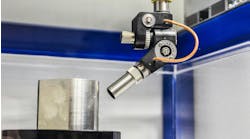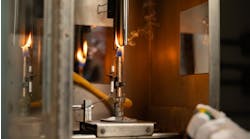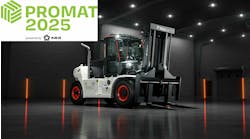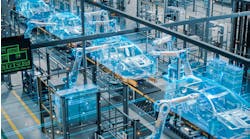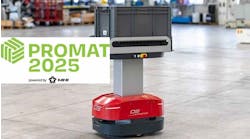Manufacturing's Latest Firsts: New Breakthroughs From ABB, RL Core Technologies, and More
Manufacturing Firsts is a recurring round-up where each installment will spotlight technological and manufacturing innovations that represent genuine "firsts" in their respective industries. We'll explore breakthrough developments that signal important shifts in how companies design, engineer, and produce cutting-edge products.
ABB Marks an Industry-First With Emissions Monitoring System
ABB's CEM-DAS is the first data acquisition and handling system (DAHS) to pass the new international emissions monitoring standard test EN 17255—the first international standard for DAHS in emissions monitoring.
The EN 17255 standard is expected to improve the quality of data acquisition and handling system reporting internationally by providing standardized protocols for data collection, validation, and reporting.
It aims to ensure consistency and accuracy across different systems and regions, enhancing data integrity, facilitating regulatory compliance, and giving plant operators confidence in the reliability of their emissions monitoring systems.
Upon successfully completing the tests, ABB has become the first company to offer a complete package of continuous gas analysis and DAHS systems fully compliant with international standards.
DAHS are computer-based systems that collect and process information on air pollutants measured by continuous emissions monitoring systems (CEMS). The measurements are processed to produce reports demonstrating compliance with regulatory emissions limits.
The new standard allows plant operators across industries such as power, oil & gas, waste-to-energy, cement, and chemicals to choose DAHS that have been assessed by an independent testing laboratory and certified by an independent certification body.
Carried out over a period of six months, the tests were conducted by TÜV Rheinland Energy Environment, GmbH, an accredited laboratory that tests, inspects, and certifies technical systems and facilities. The tests showed that CEM-DAS's emissions reporting provided reproducible results regardless of vendor-specific data processing methods.
RL Core Technologies Successfully Closes Funding for New AI That Optimizes Industrial Control Systems
RL Core Technologies has closed a $5 million series seed funding round—backed by TQ Ventures, a New York-based venture capital fund, and Flying Fish Ventures—for its AI software that optimizes performance and improves reliability in industrial control systems. The funds will be used to drive global expansion of cost-saving and energy-efficient solutions.
RL Core Technologies provides deep learning software that boosts the efficiency and reliability of industrial control systems. The company has proven that its software solutions can lower two of the largest drivers of cost in water treatment—energy and chemical consumption—increasing efficiency, reducing expenses, and achieving consistent regulatory compliance.
For its customers, RLCore has conducted automatic PID tuning improving flow rate by 50% over default, achieved fully automatic chlorine injection allowing for precise dosing, and attained a 20% improvement in backwash.
RLCore uses reinforcement learning for its artificial intelligence (AI) which is a branch of AI where software learns to make decisions to achieve improved performance while interacting with its environment as opposed to imitating humans.
Neural Propulsion Systems Launches AI Radar for New Era in Auto Safety
Neural Propulsion Systems (NPS), a pioneer in next-generation radar operating systems, announced its advancements in automotive radar systems that harness the power of new mathematics and AI to immediately establish new performance standards for advanced driver assistance system (ADAS).
Developed by a core team of mathematicians and AI and ML specialists from Caltech and the Technical University of Munich, the Hyper-Definition Radar Operating System (HROS) uses advanced AI with patented mathematical frameworks to address critical safety challenges such as providing visibility in low light, fog, and high speeds. HROS enables reliable radar image classification, which isn't feasible with current solutions that combine low definition RADARs and machine learning.
According to NPS, HROS delivers 10x higher resolution than current tier 1 radar market providers, 4x higher resolution than advanced radar technology for L4, and the ability to distinguish a pedestrian next to a car at 500 feet (150 meters) in any weather or at any time of day.
HROS meets the 2029 National Highway Traffic Safety Administration (NHTSA) standards for automatic emergency braking (AEB).
